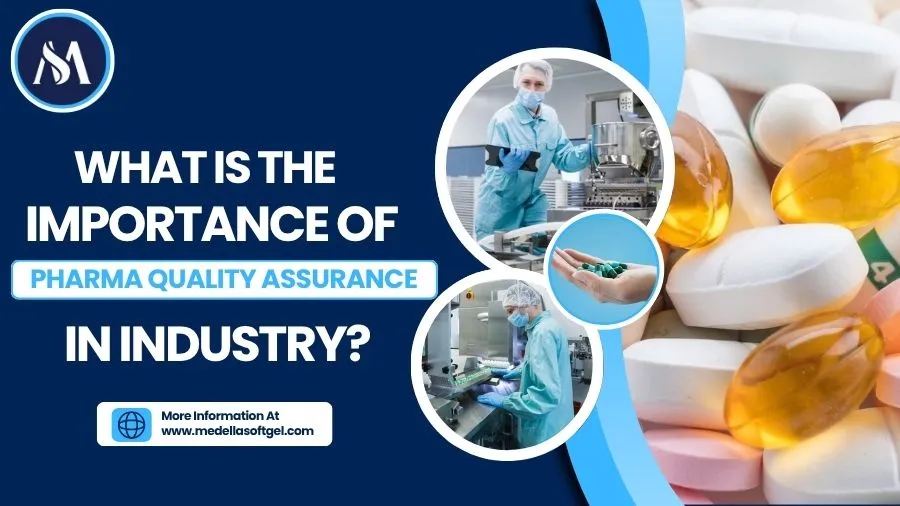
What is the Importance of Pharma Quality Assurance In Industry?
You expect a medication to be both safe and effective when you or a loved one takes it. You have faith that it will help you recover rather than worsen your condition. There is a reason for this trust. It is the outcome of a rigorous, meticulously planned system that ensures each and every pill, injection, and syrup is of the greatest caliber. Pharma Quality Assurance is the name of this system.
Quality is a life-or-death necessity in the medical field, not just a nice-to-have. Quality assurance in pharmaceuticals is an all-encompassing system that guarantees a medication is manufactured correctly each and every time, from the start of its journey to the point at which it is delivered to the patient. It is the unsung defender of public health, and its significance to the sector cannot be emphasized.
In a booming market like India, where many businesses rely on Third Party Pharma Manufacturing Companies in India, let’s learn what quality assurance in pharmaceutical companies actually entails, why it’s so important, and what it entails.
What is Quality Assurance in a Pharmaceutical Company?

Think of pharma quality assurance in pharmaceuticals as a proactive watchdog, a system that is intended to stop issues before they even arise. It is not just about verifying that the final pharma products is correct it is also about ensuring that every single step of the manufacturing procedure is correct, from the equipment to the raw materials to the workers in the factory.
Building quality into the product from the beginning is the primary objective of quality assurance in pharmaceutical industry. This is not the same as “quality control,” which is a more reactive method of looking for flaws in a final product. QA is the larger picture, even though quality control is a component of pharmaceutical industry quality assurance. It involves establishing the guidelines, educating the employees, and conducting process audits to make sure everything is carried out correctly.
A strong system for pharmaceutical quality assurance consists of –
1. Standard Operating Procedures (SOPs) – These provide comprehensive, sequential guidance for each task, guaranteeing uniformity.
2. Training and Audits – To ensure that the regulations are being followed, all staff members receive regular training, and all procedures are audited.
3. Risk Management – Risk management is the process of spotting possible issues and developing strategies to prevent them.
4. Documentation – Maintaining thorough records of each and every stage of the procedure.
Regulators and, most importantly, patients rely on this entire framework to ensure that a medication is pure, safe, and effective.
The Three Core Pillars of Pharma Quality Assurance

Patient safety, regulatory adherence, and company reputation are the three primary pillars that support the significance of pharmaceutical industry quality assurance.
1. Patient Safety – The Ultimate Responsibility
Protecting patients is the main justification for rigorous quality assurance. The purpose of medicines is to heal, not to injure. A single batch of medication gone wrong could have disastrous, even lethal, effects.
A strong quality assurance in pharmaceuticals system guarantees –
- Proper Ingredients and Dosage – It ensures that the appropriate active ingredients are utilized in the appropriate dosage. A mistake here could render a medication dangerously strong or useless.
- No Contamination – QA keeps dangerous materials out of the medication, such as bacteria or other chemicals. This is the main goal of all cleaning and hygiene procedures.
- Stable and Effective Shelf Life – It guarantees that the medication will continue to be stable and effective for the duration of its shelf life. If a patient depends on a medication that loses its effectiveness before its expiration date, it is both worthless and possibly harmful.
Without these stringent controls, a doctor’s prescription medication may not function as intended, endangering the patient’s health. Every quality assurance in pharmaceutical companies efforts is motivated by this moral and ethical obligation.
2. Regulatory Compliance – Following the Law
One of the sectors with the strictest regulations worldwide is the pharmaceutical sector. Strict regulations are set by governments and health authorities, such as the FDA in the US and the CDSCO in India. GMP stands for Good Manufacturing Practices.
A robust pharmaceutical quality assurance system is necessary for –
- Passing Inspections – Manufacturing facilities are subject to routine, surprise inspections by regulatory agencies. A business with a subpar quality assurance system will fail these inspections, which may result in significant fines, product recalls, or even facility closure.
- Fulfilling International Standards – A large number of Indian quality assurance in pharmaceutical companies manufacture medications for international markets. This implies that they must satisfy not only Indian standards but also those of the US, UK, and Europe. QA guarantees that a product can be sold all over the world.
- Audits and traceability – All steps in the production process need to be recorded. A business must be able to identify the precise batch, raw material, and machine that caused an issue. Only a robust QA system can achieve this degree of traceability.
Following these guidelines is important for gaining the public’s and regulatory bodies’ trust as well as for obtaining an operating license. It’s not just about avoiding fines.
3. Business Reputation – Building Trust and Success
Reputation is crucial in the pharmaceutical industry. A company’s reputation can be ruined overnight by a single product recall or a significant regulatory infraction, and it may take years or even decades for it to recover.
An excellent quality assurance in pharmaceuticals industry program benefits a company in the following ways –
- Build Brand Trust – Consumers, physicians, and pharmacists have more faith in a company’s brand when they are aware of its consistently high-quality products. Repeat business and loyalty are the results of this trust.
- Steer clear of costly recalls – Removing a medication from distribution can be very costly. It encompasses not only the product’s price but also the expenses of research, distribution, and brand harm. Recalls are avoided altogether through proactive QA.
- Become a Preferred Partner – Quality assurance is the first consideration for businesses searching for a third party manufacturing pharma partner. A business that has a solid reputation for pharmaceutical industry quality assurance will be able to charge more for its services and draw in more business.
A company’s dedication to quality is its greatest competitive advantage in a market that is extremely competitive.
Quality Assurance in Third-Party Pharma Manufacturing in India

In terms of Third-Party Pharma Manufacturing Company in India, it has emerged as a global leader. This indicates that a large number of large pharmaceutical companies contract with specialized Indian companies to handle their manufacturing. Because it enables businesses to cut expenses and concentrate on their own marketing and research, this model is highly well-liked.
Nonetheless, the third party manufacturing pharma company bears a great deal of responsibility under this model to uphold the highest standards of quality.
A company’s brand reputation is at risk when it outsources its manufacturing.
1. The Shared Responsibility – Quality is a shared responsibility between the manufacturer and the owner of the brand. The brand owner needs to pick a partner with a track record of successful quality assurance and conduct a thorough audit. In turn, the manufacturer needs to have a robust quality system to safeguard their clients and their own reputations.
2. Key QA Checks for Third-Party Manufacturers – The top pharmaceutical companies for third-party manufacturing quality assurance include –
- Testing of Raw Materials – Prior to being permitted entry into the factory, each and every raw material is examined for quality and purity.
- In-Process Inspections – To identify issues early, routine inspections are carried out at each stage of the manufacturing process, from mixing to packaging.
- Testing of the Final Product – Prior to release, the final product undergoes extensive testing for safety, potency, and purity.
- Batch Documents – Every batch is meticulously documented so that any issues can be identified and resolved.
A business that succeeds in these areas establishes itself as a leader in the Pharma Quality Assurance industry and a reliable partner.
The Future of Quality Assurance – Technology and Continuous Improvement

Quality assurance in pharmaceuticals plays a dynamic role that is always changing due to new technologies and more stringent regulations.
1. Automation and AI – Quality checks are becoming quicker and more precise thanks to new technologies like automation and artificial intelligence (AI). These days, machines are able to keep an eye on procedures and spot minute mistakes that a human might overlook. Additionally, AI can anticipate possible issues before they arise, enabling even more active quality control.
2. Data Integrity – A key component of quality assurance in an increasingly digital world is making sure that all data is secure and accurate. For regulatory compliance, this entails putting mechanisms in place to stop data from being altered or lost.
3. A Culture of Quality – Ensuring that everyone in the company, from the CEO to the factory floor worker, comprehends and is dedicated to quality is the first step towards the best quality assurance in pharmaceutical industry. Learning, developing, and aiming for excellence are ongoing processes.
Conclusion
There is no denying the significance of quality assurance in pharmaceutical company. It is the structure that ensures each medication we take is reliable, safe, and effective. For businesses, it is essential to achieve long-term success, a solid reputation, and regulatory compliance.
At Medella Softgel, we believe that a strong pharma quality assurance system is the most valuable asset of any Third Party Manufacturing Pharma company in India. It’s what enables us to gain the trust of our customers and contribute significantly to the global supply of safe medications.
Thus, the next time you hold a medication in your hand, keep in mind the pharmaceutical industry’s silent yet effective pharmaceutical industry quality assurance system. At Medella Softgel, this dedication saves lives every day and forms the basis of trust between our business and patients worldwide.
Also Read: Top 10 Trusted Paracetamol Manufacturers in India









